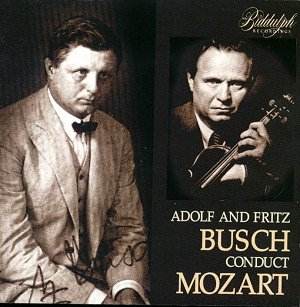AVAILABILITY
www.biddulphrecordings.com
This disc performs a useful service in collating
the Busch brothers’ Mozart recordings made between 1934 and 1938.
This was a time of voluntary exile from Hitler’s Germany and saw
the foundation of Adolf’s conductorless chamber orchestra, in
1935, which he led from the first desk. Fritz found a base in
Copenhagen where he lived for six years while conducting the Danish
Symphony Radio Orchestra, a job entrusted to him and Nikolai Malko
jointly as they were charged with the responsibility of expanding
the repertoire of Launy Grøndahl’s band. The Eine Kleine
Nachtmusik here is a souvenir of his pre-War work with the ensemble
and is a slightly later recording than its companion, the 1934
BBC Linz Symphony, a work he re-recorded after the War
with his Danish forces with more conspicuous success.
The Adagio and Fugue receives from the Busch
Chamber Players a reading of magisterial breadth, complete with
strong and vibrant string playing and discreet portamenti. The
Serenade, recorded almost exactly a year later, is notable for
Adolf’s elegant and lyrical solos and the bluff and buoyant Rondeau;
allegretto conclusion. The transfers here are very clean and clear
allowing detail properly to register. The E flat Piano concerto
brings to the fore Adolf’s son-in-law, Rudolf Serkin. There are
plenty of attractive features here and I have to say that I prefer
Biddulph’s transfer to the rather noisier and less clear one on
EMI. There is still a slightly shallow and plumy piano sonority
but this can’t really be helped and if there are some exposed
orchestral string incidents and examples of less than Olympian
orchestral unanimity these are relatively minor matters. The 1934
Linz with Fritz conducting is somewhat disappointing. String discipline
is noticeably lacking in places and there are rather too many
unwieldy and inorganic-sounding portamenti. Comparison with the
almost contemporaneous Beecham shows that whilst Busch is more
fleet and driving Beecham is the more precise and the more captivating.
This is a valuable release, somewhat variable
interpretatively in places but nevertheless a more than honourable
salute to two distinguished musicians. Fortunately sound quality
is excellent and unobtrusive.
Jonathan Woolf
